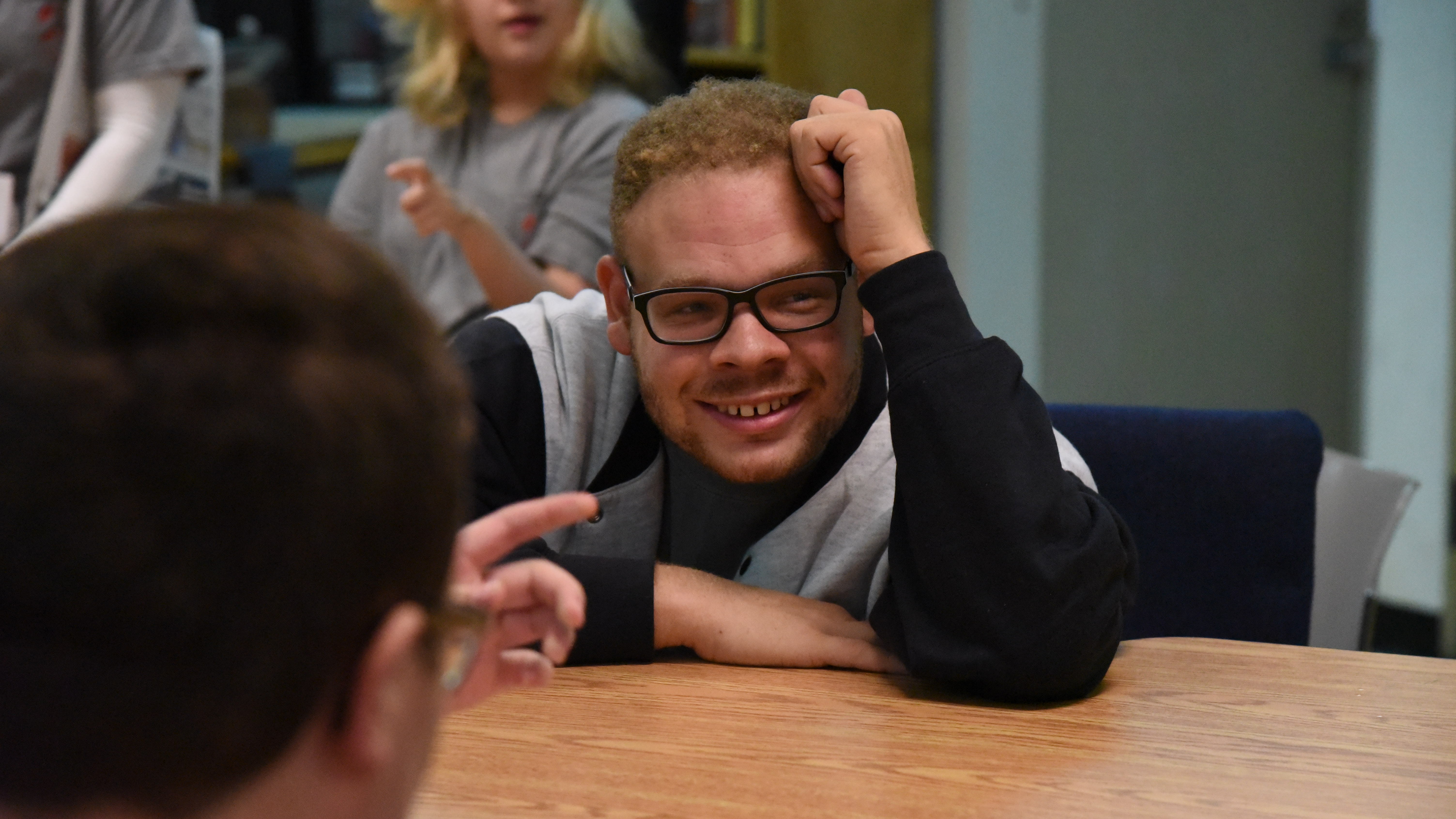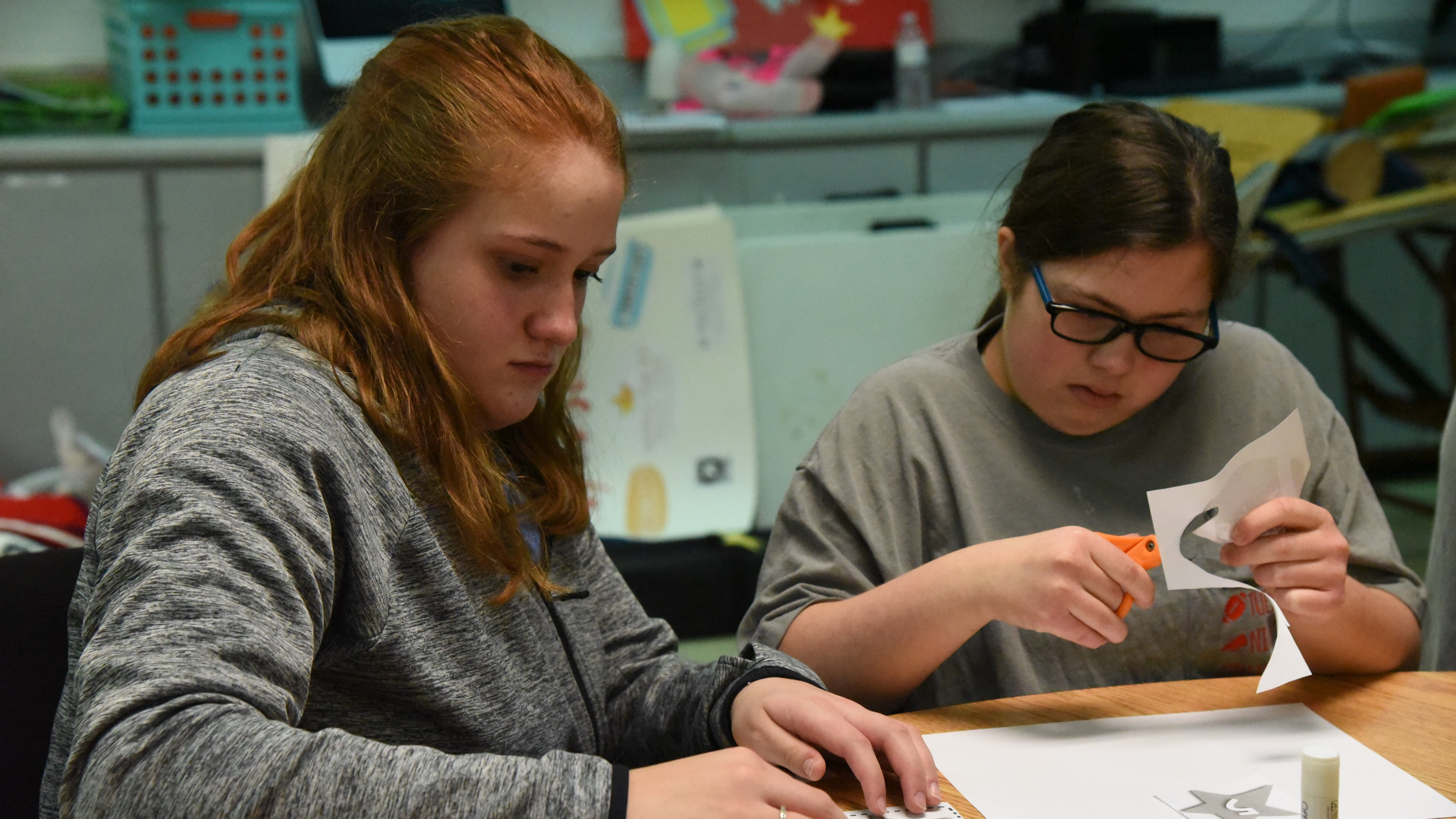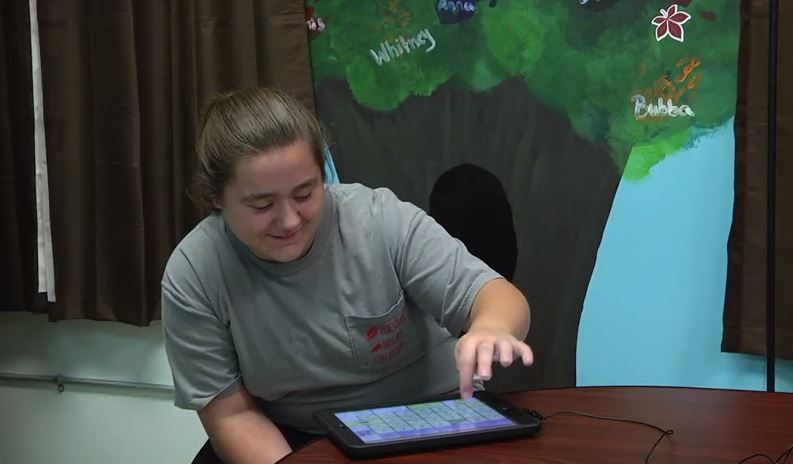-
Peer Tutors Promote
Inclusion, Positive CulturePosted by Josh Flory on 11/15/2019 Westen Henry is a senior at Halls High School, one of several schools within KCS where peer tutors help support special education students.
Westen Henry is a senior at Halls High School, one of several schools within KCS where peer tutors help support special education students.Westen Henry’s favorite thing about Halls High School is the friends he’s made during his time as a student.
But for Henry and other special education students at Halls, friendships are also an important factor in their academic success.
Halls and other schools across KCS offer peer tutoring programs, in which general education students spend time in special education classes, where they assist with lessons and provide one-on-one guidance for in-class work.
The idea is not only to provide support for special education students, but also to offer learning opportunities for general education students.
“Peer models are really important in teaching students new skills, so having peer tutors in there to serve as models and provide different supports in the classroom is really important,” said Jason Myers, Executive Director of Student Supports at KCS. “And from a social standpoint -- developing an inclusive, positive culture in a school -- it serves a vital role.”
On a recent morning at Halls High School, special education teacher Sarah Wheeler read a story about football and engaged students in conversation about the sport. It was a timely topic because the school’s annual “Tuesday Night Lights” game, in which special education students got a chance to play a game on the field and perform as cheerleaders, was scheduled for that evening.
The classroom included students with a wide variety of abilities, including some who used wheelchairs and others who used electronic devices to assist with communication. At the same time, as the class transitioned into hands-on activities using scissors and glue sticks, much of the assistance was provided by general education peer tutors, who talked with their special ed counterparts and assisted them with their work.
Ellie Hassell, a sophomore at Halls who serves as a peer tutor, is considering a career as a special education teacher, and said she enjoys the chance to work with others and the feeling of making a difference.
Asked why it’s important to have peers serving as tutors, Hassell said they can relate to what special ed students are going through, because they’re all students together. “And you’re easier to talk to at points, because (students) don’t want to talk to adults about some things,” she added. “So it’s nice to have somebody to just sit down and chat with sometimes.”
 Peer tutor Ellie Hassell (left) works on a project with Morgan Holbert during a class at Halls High School.
Peer tutor Ellie Hassell (left) works on a project with Morgan Holbert during a class at Halls High School.For her part, Wheeler got a bachelor’s degrees in psychology, then worked as a teaching assistant at Brickey-McCloud Elementary while getting her master’s degree. After realizing that she didn’t want a desk job, Wheeler decided to pursue a master’s in special education while working full-time as a first-year teacher at Halls.
Wheeler said peer tutors provide validation for special ed students, and that they have a good sense of when to offer support and when to step back.
“They’re not about socializing with each other, they’re not concerned with what’s going on with themselves or their phones, they come in and they’re about our students … They’re just really in tune with what my students need and I feel like that comes from just spending time with them,” she said.
Those interactions don’t just happen in the classroom. Peer tutors sometimes take their special-ed counterparts out for ice cream or a movie, and they also participate in “unifying sports” through the Special Olympics, in which they team up for an athletic competition.
Alyssa Geoffrion, a 9th-grader at Halls, works with Hassell, and uses an electronic tablet to communicate. Geoffrion is a writer, whose interests include zombie horses and airplanes such as the Blue Angels. Asked how she’s learned about airplanes, Geoffrion used the tablet to say “I learned about them since I saw them … at the airport.”
Besides providing support and learning during high school, the peer tutoring program can also plant a seed that draws students into education.
Myers, who leads the Student Supports department for KCS, said he worked as a peer tutor during high school.
“It was incredibly impactful for me,” he said. “It put me in an environment where I was with students who were different than me. I was exposed to different learning styles and various things, and I just developed an interest in working with students with disabilities.”
To see a video about peer tutoring, visit our YouTube channel.
 Alyssa Geoffrion, a 9th-grader at Halls, has worked with peer tutor Ellie Hassell and said the program is helpful.
Alyssa Geoffrion, a 9th-grader at Halls, has worked with peer tutor Ellie Hassell and said the program is helpful.
Select a School...
Select a School
- A.L. Lotts Elementary (es)
- Adrian Burnett Elementary School (es)
- Amherst Elementary School (es)
- Austin-East Magnet High School (hs)
- Ball Camp Elementary School (es)
- Bearden Elementary School (es)
- Bearden High School (hs)
- Bearden Middle School (ms)
- Beaumont Magnet Academy (es)
- Belle Morris Elementary School (es)
- Blue Grass Elementary School (es)
- Bonny Kate Elementary School (es)
- Brickey-McCloud Elementary School (es)
- Career Magnet Academy (hs)
- Carter Elementary School (es)
- Carter High School (hs)
- Carter Middle School (ms)
- Cedar Bluff Elementary School (es)
- Cedar Bluff Middle School (ms)
- Cedar Bluff Preschool (p)
- Central High School (hs)
- Chilhowee Intermediate School (es)
- Christenberry Elementary School (es)
- Copper Ridge Elementary School (es)
- Corryton Elementary School (es)
- Dogwood Elementary School (es)
- Dr. Paul L. Kelley Volunteer Academy (hs)
- East Knox County Elementary School (es)
- Fair Garden Family Center (p)
- Farragut High School (hs)
- Farragut Intermediate School (es)
- Farragut Middle School (ms)
- Farragut Primary School (es)
- Fort Sanders Ed. Development Center (p)
- Fountain City Elementary School (es)
- Fulton High School (hs)
- Gap Creek Elementary School (es)
- Gibbs Elementary School (es)
- Gibbs High School (hs)
- Gibbs Middle School (ms)
- Green Magnet Academy (es)
- Gresham Middle School (ms)
- Halls Elementary School (es)
- Halls High School (hs)
- Halls Middle School (ms)
- Hardin Valley Academy (hs)
- Hardin Valley Elementary School (es)
- Hardin Valley Middle School (ms)
- Holston Middle School (ms)
- Inskip Elementary School (es)
- K.A.E.C.
- Karns Elementary School (es)
- Karns High School (hs)
- Karns Middle School (ms)
- Karns Preschool (p)
- L&N STEM Academy (hs)
- Lonsdale Elementary School (es)
- Maynard Elementary School (es)
- Mill Creek Elementary School (es)
- Mooreland Heights Elementary School (es)
- Mount Olive Elementary School (es)
- New Hopewell Elementary School (es)
- Northshore Elementary School (es)
- Northwest Middle School (ms)
- Norwood Elementary School (es)
- Pleasant Ridge Elementary School (es)
- Pond Gap Elementary School (es)
- Powell Elementary School (es)
- Powell High School (hs)
- Powell Middle School (ms)
- Richard Yoakley School
- Ridgedale School
- Ritta Elementary School (es)
- Rocky Hill Elementary School (es)
- Sarah Moore Greene Magnet Academy (es)
- Sequoyah Elementary School (es)
- Shannondale Elementary School (es)
- South Knoxville Elementary School (es)
- South-Doyle High School (hs)
- South-Doyle Middle School (ms)
- Spring Hill Elementary School (es)
- Sterchi Elementary School (es)
- Sunnyview Primary School (es)
- Vine Middle Magnet School (ms)
- Knox County Virtual School (hs) (es) (ms)
- West Haven Elementary School (es)
- West High School (hs)
- West Hills Elementary School (es)
- West Valley Middle School (ms)
- West View Elementary School (es)
- Whittle Springs Middle School (ms)

